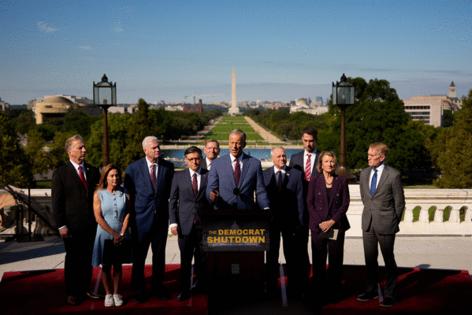Republicans hammer immigration rhetoric on health care, though details are elusive
Published in News & Features
WASHINGTON — As the threat of a shutdown loomed this week, Republican leaders united behind a message: They weren’t going to cut a deal that would let Democrats provide health care to undocumented immigrants.
This talking point, which has been repeated by President Donald Trump down through rank-and-file members of Congress, largely skirts the biggest issue for Democrats — extending as soon as possible the enhanced health care premium subsidies that expire at the end of the year. But it may be tangentially related to a similar concession wanted by Democrats, and that may be driving the GOP reaction.
“If it seems like the only sentence that Republicans can form these days consists of a noun, verb, and illegal immigrant, that’s because they have to resort to outright lies to defend their truly God-awful health care policies,” Sen. Patty Murray, D-Wash., said this week.
The health care subsidies, which arise from the 2010 law commonly known as Obamacare, are meant to help make health insurance more affordable. Congress loosened income eligibility for the credits during the COVID-19 pandemic in 2021 and extended them in 2022. The premium subsidies are set to expire Dec. 31 without congressional action.
If they lapse, health care costs will rise precipitously for millions of Americans. While Democrats proposed extending the subsidies in a short-term spending bill, they also want to roll back some cuts from the sweeping tax bill Republicans passed in July.
And therein lies the issue.
Undocumented immigrants cannot participate in taxpayer-funded health care programs, nor can they purchase health care plans on the HealthCare.gov exchanges or receive any subsidies. What Democrats are proposing wouldn’t make them eligible for these programs or subsidies, even if Republicans’ messaging might suggest otherwise.
But Democrats do want to reverse a change made by Trump’s tax and immigration law that made certain groups of “lawfully present” immigrants no longer eligible for subsidies.
While there’s no single definition of lawfully present, most states define it as those with legal immigration status, including those with Temporary Protected Status, Deferred Enforced Departure or work visas. This can include refugees and asylees.
And while Republicans haven’t explained their claims, the restoration of benefits to these groups could be the origin.
Deferred Action for Childhood Arrivals, or DACA, recipients have lawful presence in the U.S. but are not eligible for marketplace subsidies. Until 2024, DACA recipients were not considered “lawfully present” for the purposes of health coverage and were therefore excluded. And as of Aug. 25, they are once again excluded from such coverage due to Trump administration regulations, said Drishti Pillai, associate director for immigrant policy at KFF.
Nevertheless, the Republican messaging has continued, including from Vice President JD Vance and Senate Republicans. Speaker Mike Johnson said that Senate Minority Leader Charles E. Schumer “wants to reinstate free health care for illegal aliens paid by American taxpayers. We are not doing that. We can’t do that.”
Trump took it to a new level on Monday by posting a deepfake AI-generated video on Truth Social, roundly criticized as racist, that mocks House Minority Leader Hakeem Jeffries, D-N.Y., and Schumer, while mariachi music plays in the background. The AI-generated dialogue for Schumer says, “If we give all these illegal aliens free health care we might get them on our side so they can vote for us.”
Rep. Randy Fine, R-Fla., tweeted before the shutdown that “Democrats are willing to stop paying American soldiers in order to give free health care to foreign invaders. If that doesn’t violate their oath of office, I don’t know what does.”
The Republican messaging on immigration sits alongside more measured criticism of Democrats that there is more time to negotiate a deal on the health care subsidies, such as when Republicans’ stopgap funding measure would end on Nov. 21.
Senate Majority Leader John Thune, R-S.D., for example, accused Democrats of manufacturing a crisis by shutting down the government over tax credits, which he said could still be addressed later in the year.
It isn’t clear, though, that the GOP’s linking of Democrats’ demands to immigration issues would be any different at that future point.
Meanwhile, the Republican statements have left Democratic lawmakers shaking their heads.
“I’m just beside myself with the nonsense surrounding this,” Sen. Ben Ray Luján, D-N.M., said.
----------
—Jessica Wehrman contributed to this report.
©2025 CQ-Roll Call, Inc., All Rights Reserved. Visit cqrollcall.com. Distributed by Tribune Content Agency, LLC.







Comments